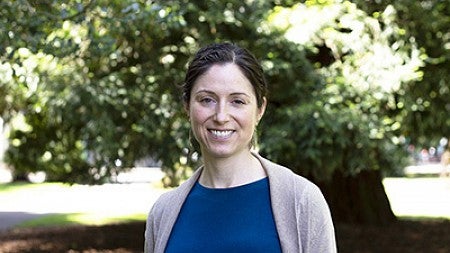
Human Physiology
rhopkins@uoregon.edu | 541-525-0403
Courses: HPHY 112 (The Science of Health), HPHY 211 (Medical Terminology), HPHY 324 (Physiology II), HPHY 325 (Anatomy and Physiology III)
In my courses you will:
- Learn with and from peers.
- Interact during exciting, participatory class meetings.
I was invited into the Teaching Academy because:
- I participated in the UO Summer Teaching Institute.
What ways are you working to make your teaching inclusive?
My department, Human Physiology, includes belonging, representation, and voice as the key pillars of inclusion in its teaching mission. I work to increase my students sense of belonging by using inclusive language, learning students’ names, holding office hours in a common department area, and acknowledging and discussing non-binary sex and gender. I work to increase student representation by including images of underrepresented communities in my lectures and having a teaching team that mirrors the diversity of undergraduates at UO. I work to increase students' voice with respectful and prompt correspondences with the teaching team, and using index cards for questions in the context of the large classroom.
What do you do in terms of professional engagement with the teaching and learning culture on campus or nationally?
On campus, I am involved with the community of online educators as I am working to develop and implement an online version of one of my courses. I coordinate and present several workshops at the HPHY Teaching Academy every fall, and lead the HPHY Teaching Book Club every term. Nationally and internationally I am involved with PMIG (Physiology Majors Interest Group) on both the planning committee for their annual meetings, as well as the core concepts committee, which is working to develop standards for implementing a framework of teaching via core concepts across physiology programs. I am a member of the Human Anatomy and Physiology Society (HAPS) and regularly present teaching workshops at their annual meetings. I also engage with the Centre for Health Education Scholarship (CHES) in British Columbia (Canada)
In what ways was your teaching in this course research-led—informed by research on how students learn and inflected by UO's research mission?
My classes include clearly articulated learning objectives, highly structured course design, transparent assignments, pre-class assignments, and regular formative assessments.
What is the most inspiring or exciting thing about your field of study?
What excites me the most about what I do is getting to know students AND making students feel known. I am fortunate to see students in multiple classes across their HPHY degree at UO. Building relationships with them and being there for them through all the highs and lows of their journey through college is a blessing I'm truly thankful for in my profession.
Who is a role model for you?
My teaching role model is Dr. Dan Pratt from the University of British Columbia (UBC). His passion for teaching and students radiates from him, and his participation and practice in the scholarship of teaching and learning is something I strive to emulate.
